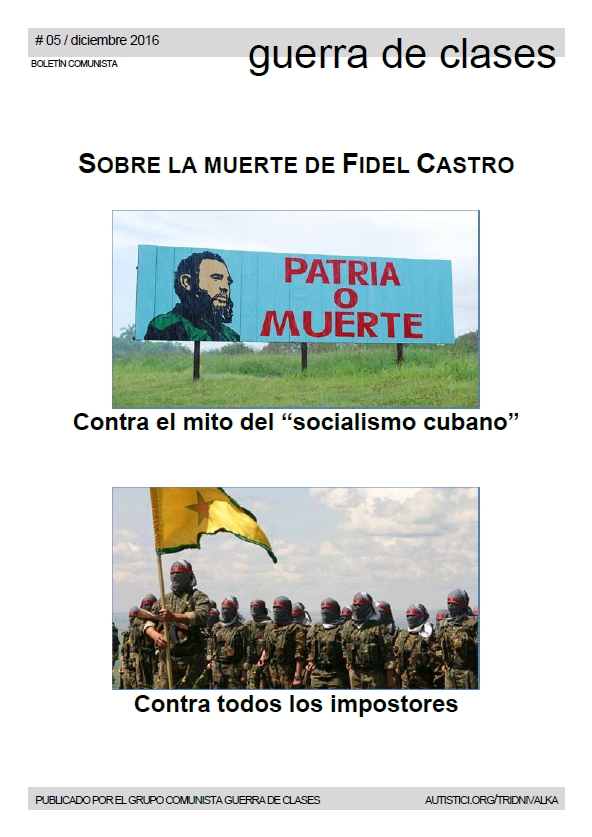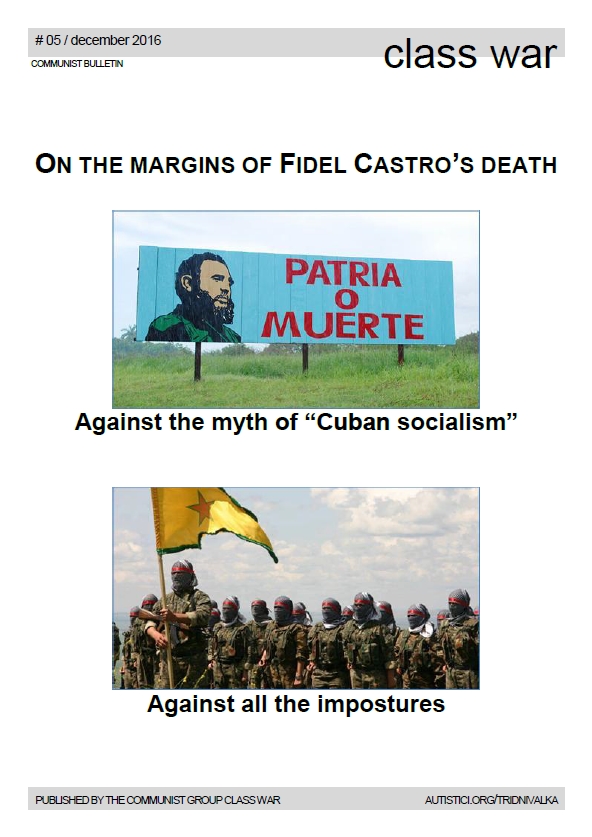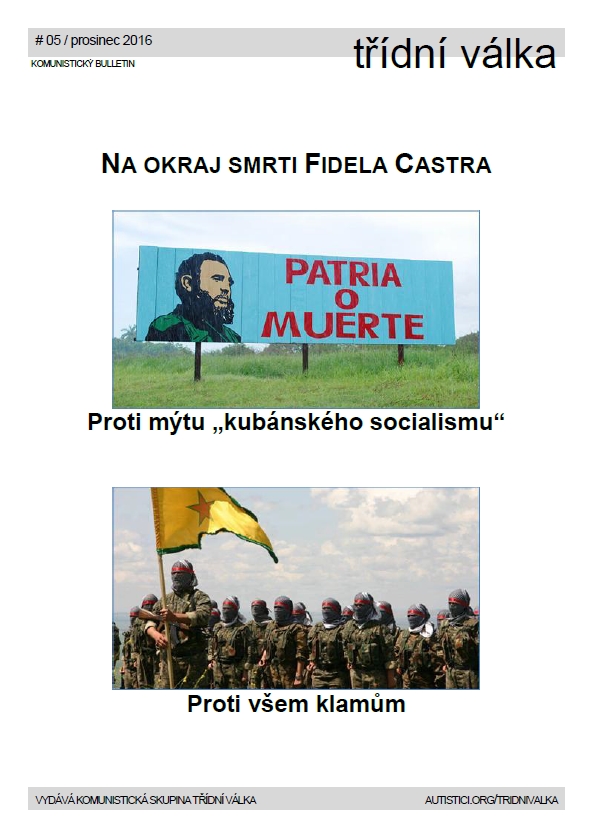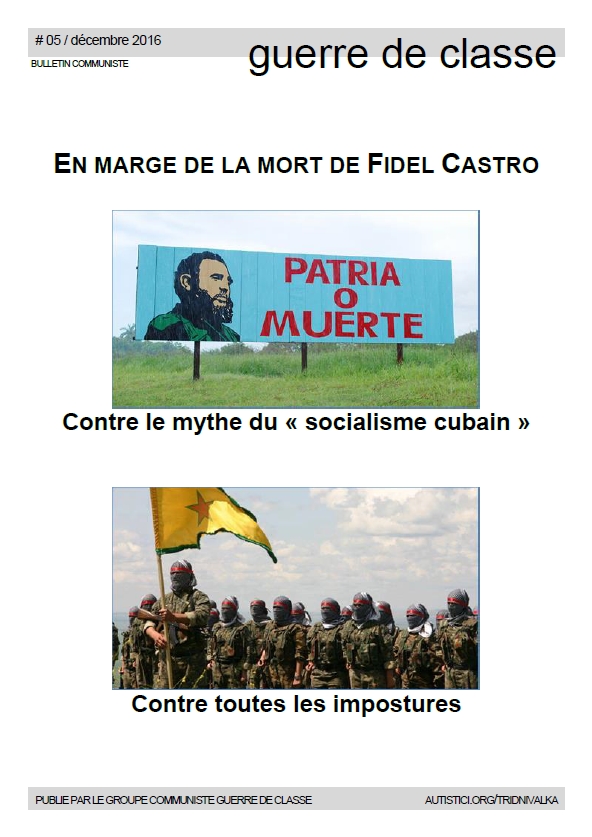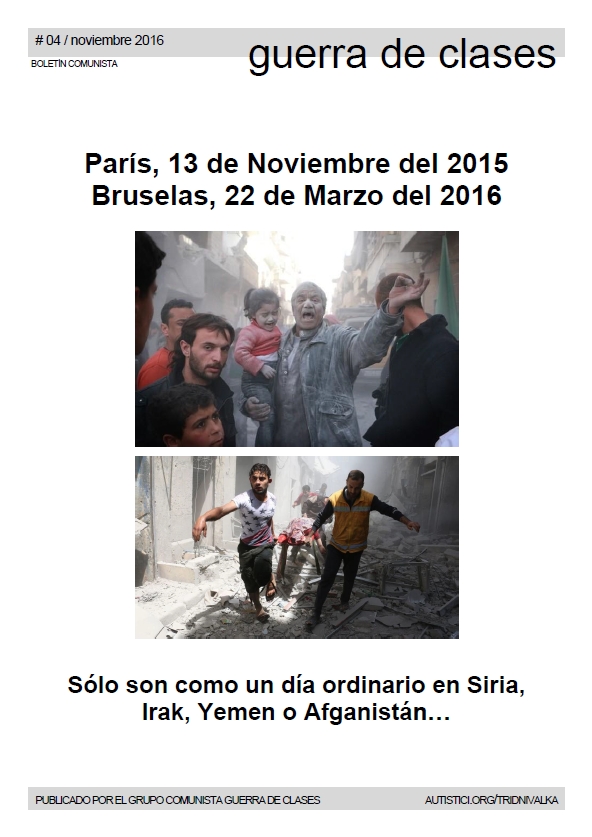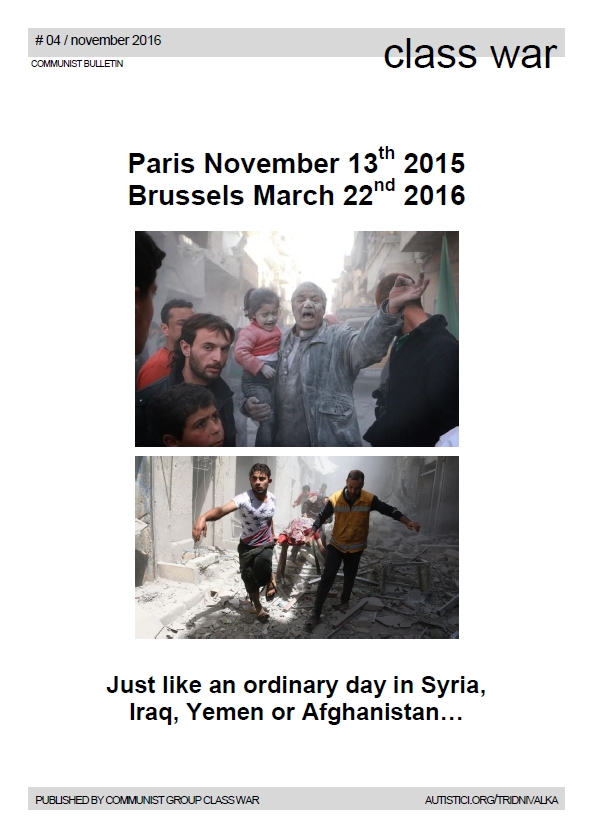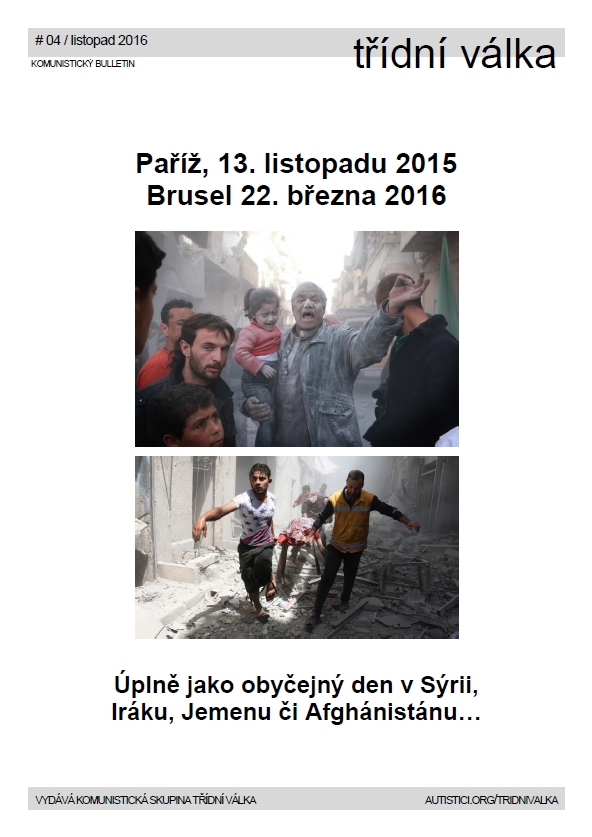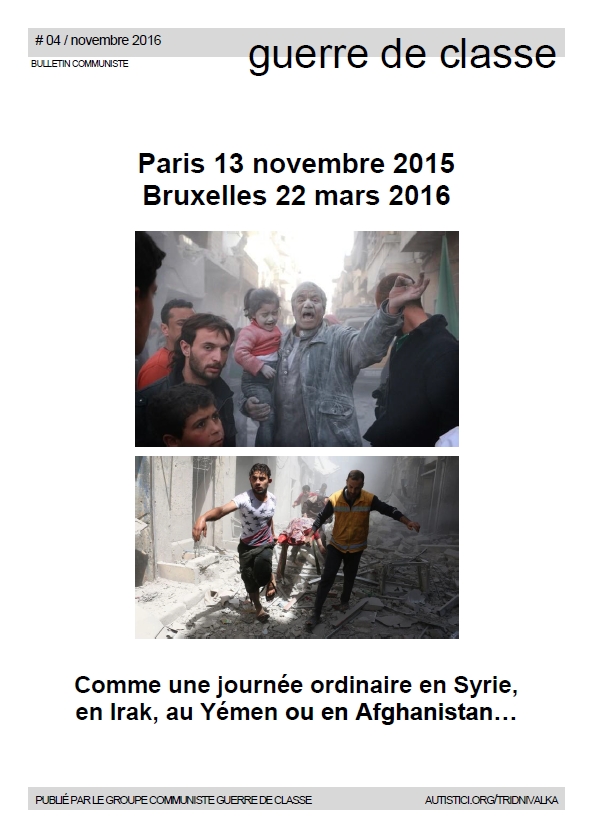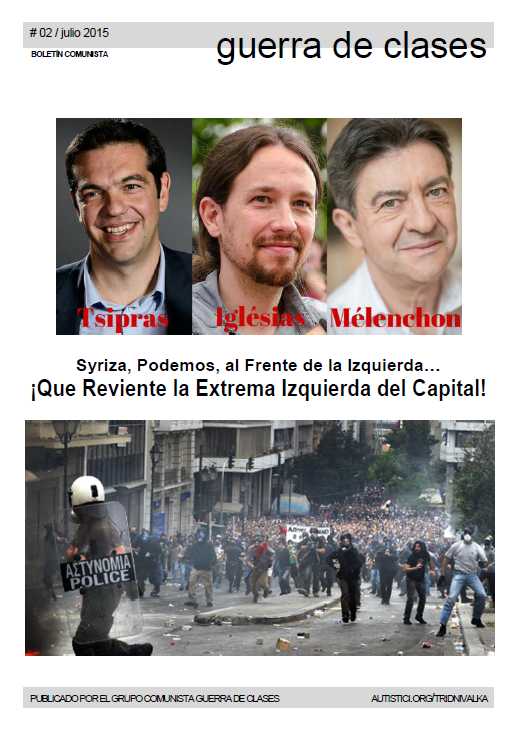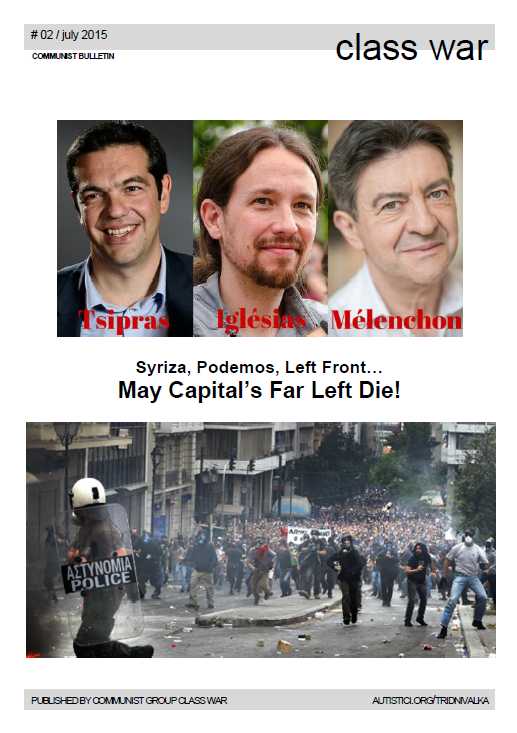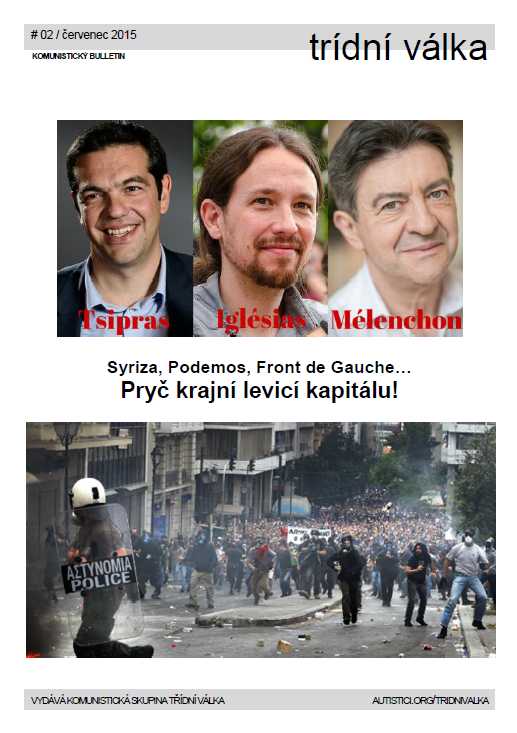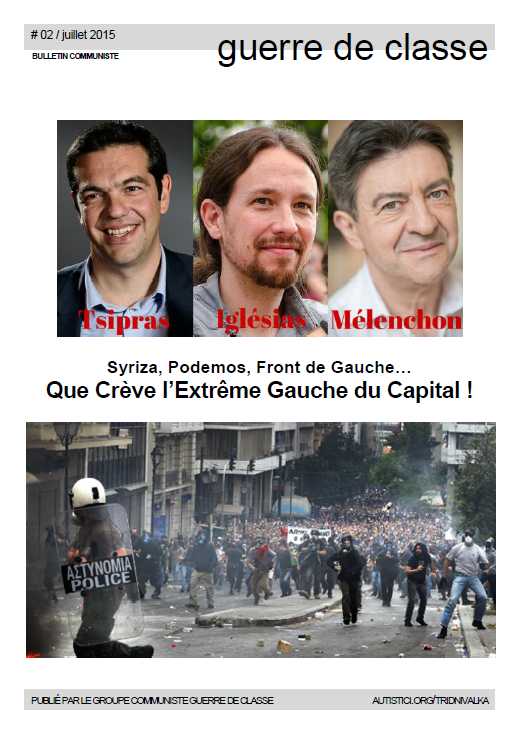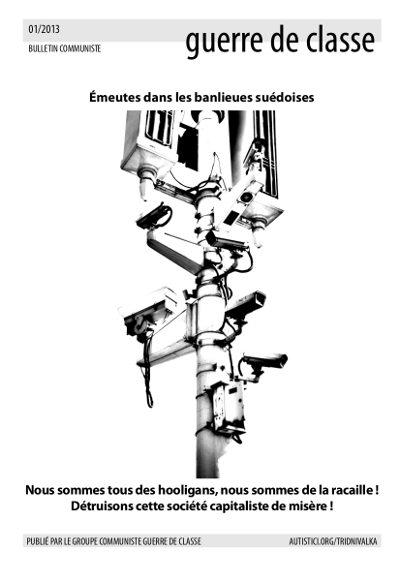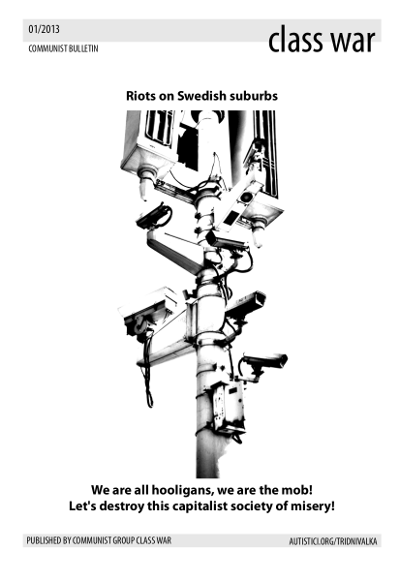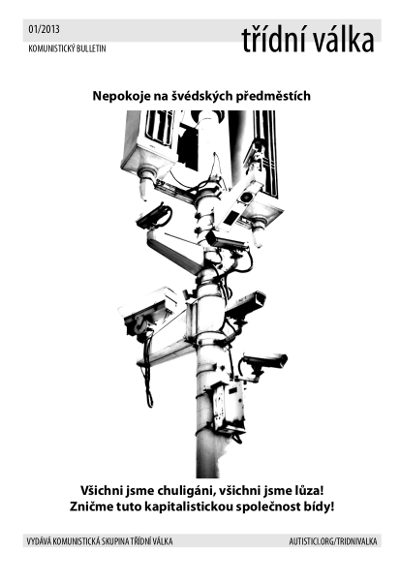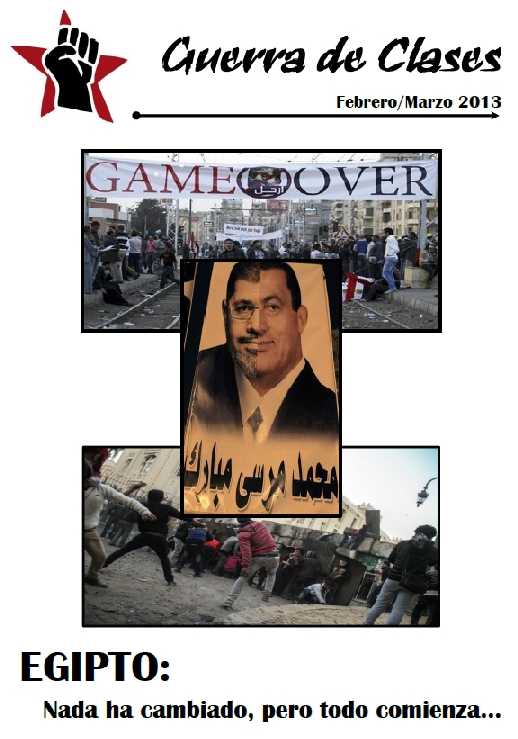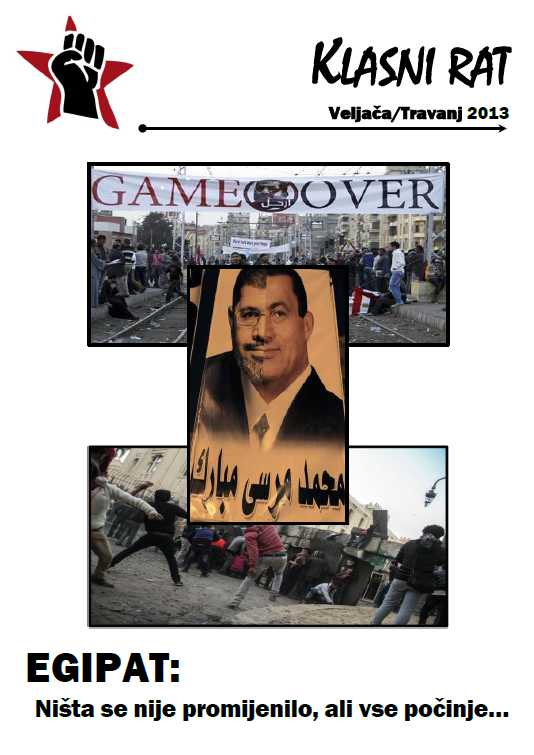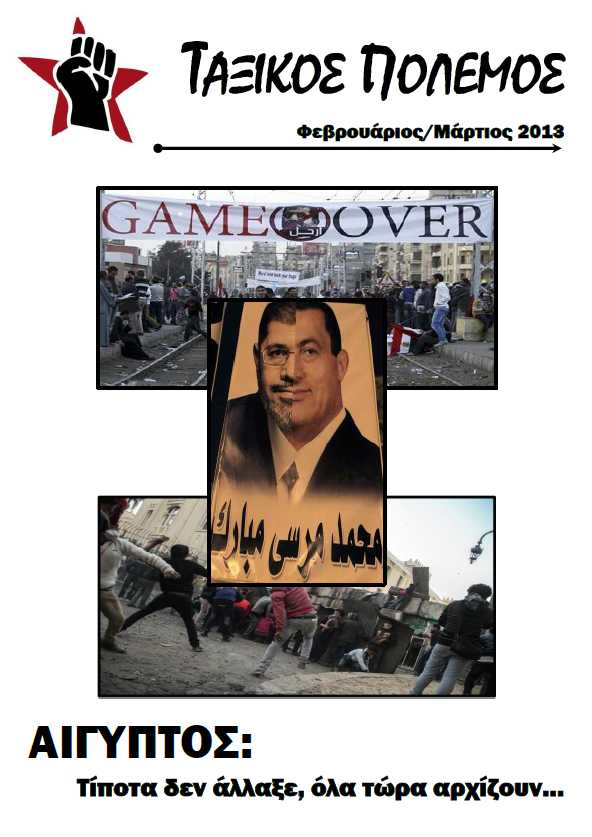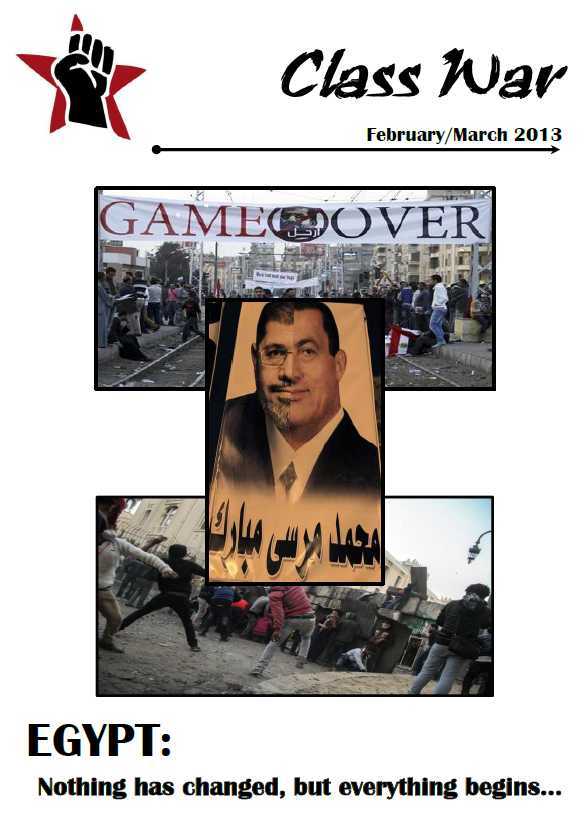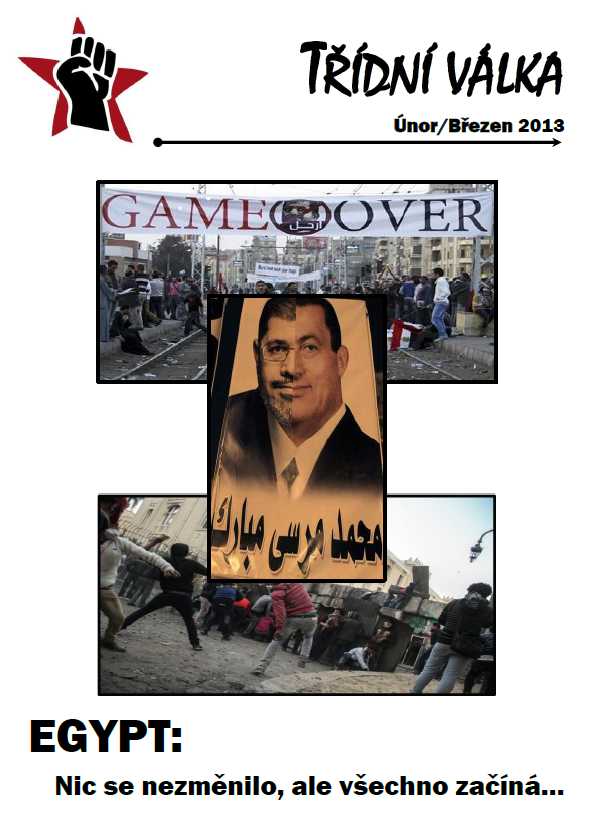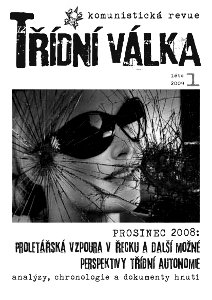Programmatically on “images of the future” emerged during the December uprising in Greece and further perspectives of the proletarian movement
“…proletarian revolutions (…) constantly criticize themselves, constantly interrupt themselves in their own course, return to the apparently accomplished, in order to begin anew; they deride with cruel thoroughness the half-measures, weaknesses, and paltriness of their first attempts, seem to throw down their opponents only so the latter may draw new strength from the earth and rise before them again more gigantic than ever, recoil constantly from the indefinite colossalness of their own goals – until a situation is created which makes all turning back impossible, and the conditions themselves call out: Hic Rhodus, hic salta! Here is the rose, here dance!”
Karl Marx (The Eighteenth Brumaire of Louis Bonaparte)
“Nothing will ever be the same,” the ruling class insisted emotively following 11 September 2001 in order to obtain consent of citizens with “the war on terrorism”. In fact, it has just world widely intensified an attack on lives of us, workers of all kinds, but there has been no qualitative change. A ride “through a dark swamp, past the white rocks” has continued. All around the world, we have continued to be exploited, alienated to ourselves, objectified a deprived of human being (physically, socially and mentally) in a shiny world of commodities. We have been just more watched over and controlled in order not to be scanted by “bad terrorists” of freedom, which is for us just freedom to sell our labour power day by day and lose our lives year by year, as we continuously instil life to Capital. Like human batteries to Matrix. Like a prey to a vampire. But then in the framework of the bourgeois state’s war against “terror”, in cold blood an unimportant cop in Athens executed a teenager, who along with his pals threw a plastic bottle of water against a patrol car. It was on 6 December 2008. Suddenly, there was a real qualitative change – that time for our class brothers and sisters…
Indeed, as if all the “escape routes” were cut off, democratic mediations and promises of the Prime Minister Karamanlis, that there would be a thorough investigation and the culprit would be lawfully punished, ceased to be effective. Our class began to dance wildly, because the rose of a passionate desire to destroy the old world of Capital, in order to avenge Alexandros and our own lost lives, blossomed. Amidst this magnificent destruction, the proletariat started to create a new world of people with exquisite lightness. By the end of 2008 the wave of insurgent violence ebbed, but the proletarian movement obviously has not disappeared. It has not vanished once again in the democratic citizen society of obedient, passive consumers and human resources, as if nothing ever happened. The class uprising produced a shift in the framework of existing balance of power between the proletariat and bourgeoisie – it is still the bourgeoisie, who is in control (not only) in Greece, but for the period of four months it has stayed shocked by a sudden increase in the proletariat’s force and unable to react adequately. As the smoke from the burning world of private property and commodities was absorbing clouds of tear gas, creating thus a space where it was possible to breathe, fight and live, the uprising’s conflagration gave birth to proletarian autonomy. So far, it is a new born baby and time will tell, whether those revolutionaries[1], who claim that “Nothing will ever be the same,” for the proletariat in Greece following December 2008, are right or not.
What is sure, is the fact, that ”after several decades, the specter of proletarian insurgency and open class struggle against Capitalism has returned to Europe,” as we wrote in our Declaration of Solidarity with Struggling and Prosecuted Proletarians in Greece. The European bourgeoisie and political figures representing it appear to be self-confident. If, according to their public proclamations, the economic crisis worries them just soberly, then the uprising in Greece and riots in Iceland, Bulgaria, Latvia or Martinique and Guadalupe (though Caribbean islands, they are French territories) “barely exist” for them. Nevertheless, they were frightened. It is visible, for instance, from a hurried suspension of a high school education reform in France that was motivated by fear that French high-school students could follow the example of their Greek counterparts[2]. Moreover, we shall not forget that mainstream bourgeois media (especially the Czech ones) more or less rubbed Greece off the map of the world – presumably because the ground has been still hot there.
That is why we come back once more to this movement. We consider it as an immensely important moment in the worldwide working class struggle of the present time. Neither we want to put together a new chronology of the December revolt, nor to recycle the analysis by Greek comrades from communist groups Ta Paidia Tis Galarias (TPTG) and Blaumachen[3]. We would rather like to do, what we have lacked in all that and what we feel urged to do. We want to make a summary of what the insurgent proletarians in Greece showed and gave to the rest of working class in all corners of the world, including the little putrefied pond of social peace in the Czech Republic. We would also like to contemplate about a possible further development of proletarian struggle not only in Greece, even while risking that we will get on a slippy ground of suppositions. But as the communist from a French group called Troploin say: “Still, better to be wrong than publish texts where nothing is at stake.”[4]
General Programmatical Considerations on the Uprising
During the long period of an almost complete triumph of capitalist counter-revolution both in the West and the East of Europe, the proletariat in this geographical area was rather a “non-class” of citizens than a class of workers fighting for their interests, understanding and organising themselves as a class. But exactly, it was this “non-class” only “rather”, as it can never be only an exploited class, the class for Capital. There is always a certain degree of resistance, though the smallest one, that reflects the class antagonism, which is the lasting basis of Capitalism. Always, we are also the class against Capital, the revolutionary class. The link between these two poles of the proletariat’s existence is the process of class struggle, in which we try to achieve satisfaction of our human needs against the needs of Capital.
At least since the mid-2008, trade unions in Greece were giving vent to proletarians’ growing anger through anti-pension reform protests. In October they turned into a union general strike and during a manifestation in Athens the most radical workers smashed banks, shops and fought the police. In the autumn the struggle got generally more intensive, a restless period started. In October high-school students occupied their schools in order to protest against a school reform. A wildcat strike and a protest of textile workers, who had not been paid their wages for four months, ended in a violent conflict with state repression too. In early November there were immigrants’ protests against a police murder of a Pakistani asylum seeker – they culminated in street clashes with riot-cops. In the city of Volos inhabitants demonstrated against growing police aggressiveness and at the end they attacked police headquarters. There were also ritual ultra-left demonstrations and clashes with the police around the anniversary of Athens Polytechnics uprising in 1973. In all 21 Greek prisons there was a hunger-strike widely supported by inmates’ families and friends, anarchists and other class militants from outside. In Corfu, there were riots of locals against opening new waste dumps – the police caused death of one of the rebels, who repaid them for this by lynching two of the pigs. At the beginning of December, there was a two-day strike of nurses, who occupied the Ministry of Health-Care. It was becoming clear that the state will use the newly passed anti-terrorist laws not so much against the chimerical Bin Laden’s crew as against all too real rebelling proletarians. On the top of all this, the news of the beginning world crisis burst in…
Therefore, the December uprising did not come out of the blue sky. It was preceded by a series of struggles stretching far behind the mentioned autumn 2008. In those struggles, minoritarian and often lonely sections of our class were getting themselves, to this or that level, into the clash with Capital and State. The proletarians were gathering experience, thinking it over, discussing it with others, meeting new people. In the same way, the ground of class subjectivity had been cultivated even before the fatal gunshot. Nevertheless, it is an indisputable fact that the revolt erupted “spontaneously” in the sense, that it grew up “from the ground of the modern society”[5], from the contradiction between wage labour and Capital (which goes through the whole web of social relations), from the class struggle itself and not thanks to years-old, untiring agitation work and tones of thrown cobble stones, as believed by some anarchists[6], who have not completely get rid off bourgeois politics yet and believe, that it is possible to voluntaristically prepare emergence of the revolutionary subject, and thus of revolution, through a certain kind of activism.
In fact, the strength of riots – though they were “ignited” by anarchists (who were the first in the streets, as always in Greece) their flames were blown in all directions mainly by thousands of “politically unorganised” high-school and university students[7] and young workers, surprised everybody, including far left “specialists on social change”. One of the insurgents wrote about this question:
“Let me comment that these are not – and could not be, given the magnitude of the “misdeeds” – the acts of the “anarchists” doing their thing. Of course anarchists and autonomies are on the first lines everywhere, but these acts are social. It’s not just about the murder or the state repression: there’s a growing feeling of revolt, against the economy, against the poverty, against the lost jobs etc. That had to break out somehow.”
“It’s getting out of hand, to the point that the insurrectionalists can’t restrain 15 year old masked up teenagers (in thousands) from attacking – unorganised and with insufficient “ammo” – the cops. Soon the kids learn, and organise together with the others.”
“We know that reports keep coming about some small town with no organized radicals whatsoever where “20 masked youth attacked with 10 petrol bombs the police station”. This is happening every night. Demos are taking place in almost every city. For example, in Athens during the demonstrations themselves, there were autonomous attacks on banks in different areas of the city.”[8]
In the same time, it is impossible to draw a linear connection from isolated and limited struggles up to the December uprising. Until that time, besides a few revolutionaries and ultra-left milieu, the rest of the class had not been contemplating about such a massive and subversive rising and no one at all had envisaged it. However, the sudden, sharp and violent explosion of accumulated anger and frustration in Athens led immediately to multiplication of collective acts of the same character throughout Greece. Under specific conditions, quantity transformed itself into quality: into the birth of proletarian autonomy, into the struggle without demands and mediators, into the struggle, which is not “single-issue” one anymore and aims against all the web of capitalist social relations and structures.[9]
It was symptomatic for the growth of autonomy, how negligible was the influence of all traditional mediators – established forms of Social Democracy, as official trade unions and leftwing parties of all kinds – on the rebels. During the struggle, the old Social Democracy further discredited itself even in the eyes of other proletarians, when it actively sided with the capitalist order against the violent uprising, it called for calm and non-violence and denounced the rebels as “hoodies”, “provocateurs” and “state agents”. In this respect, the leading role was played by the so-called Greek Communist Party (KKE) and the “socialist” PASOK, successfully seconded by the coalition of the new left SYRIZA and some Trotskyites (eg. the Committee for a Workers’ International) and “Anarchists”, who were apologizing for their more revolutionary namesakes with Molotov cocktails in their hands.
And it was no “multitude” that rose up in this autonomous struggle; no “multitude” of different social groups, which would have in common only some general fact of oppression or exploitation, which would mean something different for each of them[10]. Categories, in which we are separated by Capital in normal life (high-school or university students, young precarious workers, older workers with more or less stable jobs, immigrants from an umpteenth generation and this or that country, women, the unemployed, junkies…), did not transform into various and basically stand-alone struggles that would go on besides each other and gradually intermingle. On the contrary, all the divisions quickly collapsed, as there was only one struggle fought in the uprising and it was fought in the same way. It is self-evident that there was something deeper uniting the rebels: essentially identical conditions of existence that place them into a position of the exploited class, proletariat. Through their revolt, their unified action, they affirmed themselves as the class.
It is inevitable and undoubtedly important to note the “class composition” of participants in the uprising. Especially, in order to understand limits of the uprising, but not its content. It can help us to grasp more clearly the fact, that it was not the proletariat as a whole, who rose up, but only its smaller part, while the bigger one limited itself to passive support. Perhaps support of a majority (however, only within Greece!), but passive support of “TV watchers” after all. What was an even more essential weakness was that this passive part was a working part of the proletariat, which did not transmit the revolt on their workplaces. It failed to fully recognise itself in social critique of the rebels, to perform it practically and apply it to its life and wage labour. In other words, there was not “a general paralysation of capitalist economy, which means that there was neither an attack against wage labour and production for profit.”[11] So in the Athenian suburb Agios Dimitrios, local workers occupied the town hall, but except of municipal employees, who took part in the occupation, they failed to activate their colleagues at work.
However, “class composition” will not tell us anything about social nature of rebellious acts, because from their very outbreak this nature emerges from contradiction between wage labour and Capital, from the essence of proletariat’s life situation in general and not from a momentary situation of a certain section of wage slaves. Therefore, in the uprising, the proletariat first of all began to act in accordance with its historical interests that are invariable and not connected to “class composition”. Marx’s and Engels’ words from the depths of the 19th century are still valid:
“Since in the fully-formed proletariat the abstraction of all humanity, even of the semblance of humanity, is practically complete; since the conditions of life of the proletariat sum up all the conditions of life of society today in their most inhuman form; since man has lost himself in the proletariat, yet at the same time has not only gained theoretical consciousness of that loss, but through urgent, no longer removable, no longer disguisable, absolutely imperative need – the practical expression of necessity – is driven directly to revolt against this inhumanity, it follows that the proletariat can and must emancipate itself. But it cannot emancipate itself without abolishing the conditions of its own life. It cannot abolish the conditions of its own life without abolishing all the inhuman conditions of life of society today which are summed up in its own situation. (…) It is not a question of what this or that proletarian, or even the whole proletariat, at the moment regards as its aim. It is a question of what the proletariat is, and what, in accordance with this being, it will historically be compelled to do. Its aim and historical action is visibly and irrevocably foreshadowed in its own life situation as well as in the whole organization of bourgeois society today.”[12]
That proletariat’s “aim and historical action” is Communism and it is like this since the very beginning of our class in history. Since the first uprisings and strikes up till today, whenever we, proletarians, struggle as a class for our interests and, thus, necessarily against interests of Capital and its bourgeois managers (whether they wear toppers and smoke cigars, or wave at us from platforms under red flags with hammers and sickles[13], or are fit and slim, in suits and expensive cars), our movement is inseparable from Communism. Out of its essence, it breeds and expresses programmatically the communist tendency: an actively historical drift towards overcoming the agonizing contradiction spelled in our social position – on one hand we reproduce and multiply Capital through our wage labour and on the other hand, in the same rate, we reproduce and multiply our own dispossession and alienation. Which means, that we reproduce historically increasing misery of our “life situation”, i.e. the proletarian class, and at the same time wealth and power of the bourgeois class. Through Communism as the movement of proletarian revolutionary struggle we seek to overcome this contradiction, which we are trapped in: by refusing wage labour and by its complete abolition, we strike the Achilles’ heel of Capitalism. In this way we liquidate the most fundamental social relation, which this system rests on; we abolish ourselves as the class working for Capital and, thus, we abolish also the bourgeoisie and all relations and structures of the class society. Simultaneously, we surpass it even positively, through communization of our mutual relations and imposition of a new worldwide community of free human beings.
Even the December uprising in Greece was no exception and as a strong class movement showed an obvious communist tendency. The practice of the struggling working class, therefore, revealed all efforts at theoretical separations between “immediate” and “historical” struggles or “economic” and “political” struggles[14] as ideological constructions that are more of a burdensome heritage of social democratic influences than a useful class analysis. As there is a tendency towards complete and definitive abolition of exploitation present (at least embryonicaly) in every true class struggle for a lower level of exploitation, there is the communist tendency practically present in every proletariat’s rebellion, even if it is not a full-blown revolution.
Violent confrontation of rebels with the police in streets of many Greek cities and towns is not just an “immediate” emotional reaction to Alexandros’ death (or possibly to other victims of state terrorism). The uprising was already partially developing elements of an armed insurrection against the State and bourgeois power in general and it was not only in the form of 600 Romas in Zefyri, some of whom shot their shotguns against a police station and injured two pigs. First of all, the revolt was attacking repressive forces of the State in various ways, including pointed attacks against police stations. But it attacked the State also much more widely: some of its tentacles in forms of trade unions, schools, media or fascist storm troops. Secondly, it had its elements of organisation in the form of little combat groups of militants (whether so far “un-political” friends, or for example anarchists, who were in this respect undoubtedly an important organisation component[15]), who know well and trust each other, and coordination through mobile phones, e-mails and blogs[16]. Molotov cocktails, cobble stones, sticks, flowerpots from balconies, pellets… simply everything that was in December raining on police commandos of the capitalist party of law and order, thus, was the ammunition of the class uprising, which already necessarily contained some features of the insurrection, which should destroy state structures and their armed forces through centralizing revolutionary assaults.
Rebels were also attacking private property without any scruples. Demolished, burning banks, car showrooms, both small and big shops. Looted supermarkets. In all this there is not just ecstatic and ephemeral joy of destroying the world of Capital and commodities that is alienated to us. There are also first gestures, through which proletarians expressed their tendency to impose their own social dictatorship of human needs over Capital – dictatorship of the proletariat immediately communizing social relations. It is visible not only in direct appropriation of commodities through looting and their redistribution mediated neither by money nor any other expression of exchange value. It is visible also in appropriation of space and time, structured and used by Capital, and in forming new relations among rebels, in their self-organisation. For instance, the same radicals, who occupied Athens universities and fought the police, also set on looting expeditions to shopping centers, in order to seize food, which was subsequently used for collective cooking, eating and distributing to others. Violent riots also transformed the street space and passing of time in the street: they made from the place of fast and effective circulation of commodities a place of meeting and collective struggling of people. The movement, thus, in practice made unitary critique of social relations.
Occupations of high schools, university departments, town halls, trade union headquarters and other buildings deprive them of their purpose that they have for Capital and give them a new, proletarian one: a space for self-organisation of the militant movement in a form of small street fighting groups, “popular” or “general” assemblies. And as the comrades from TPTG and Blaumachen[17] show very well, those assemblies were not born as a reproduction of democratic mediation among atomized individuals, as a more participative version of the civil society. On the contrary, they already mirrored non-alienated relations and organic centralization of struggle, which naturally lead to the rise of the worldwide party of the proletarian revolution, the party of Anarchy, the communist party that is also a prefiguration of a global communist human community.[18] Until it is an expression of a dynamic proletarian struggle, self-organisation does not have anything in common with democracy. It is exemplified even by a note of a revolutionary from Greece, “…I wouldn’t say that voters against the occupation are tolerated – we don’t do democracy anymore.”[19] But historical experience tells us that, as soon as dynamics decreases and the balance of forces once again gets strongly in favour of the bourgeoisie, all those assemblies degenerate, democratize themselves and turn against our class, which breathed life into them.[20]
Communism is really “a historical movement unfolding in front of our eyes”[21]. That is why dictatorship of the proletariat is not only a concluding stage of the revolutionary struggle and communisation is not a kind of cherry on the top of a cake, which will come as happy ending. Proletarian dictatorship and communisation are one and the same process, which starts from the very first moment of the revolution and as a tendency exists also in pre-revolutionary struggles. Greece is full of practical examples…
However, the great part of original rebels, who did not come from the Greek ultra-left milieu, withdrew from the riots by the Christmas Day. It is impossible to continue riots indefinitely. In spite of the fact that they already contained features of an armed insurrection and communizing proletarian power, our class did not have sufficient strength and determination to come over to the insurrection and destroy the State. Thus, at the end of the day, the riots staied on the level of pitting rebels’ strength against the police, which exposes its participants to many dangers, without leading anywhere further and that started to exhaust people. The uprising ebbed.
A Revolutionary Perspective?
Those, who spoke of insurrection in December or awaited a revolution right away, fell for somewhat naive, though understandable optimism. It is an unavoidable consequence of miserable existence for decades on the verge of desperation caused by the total rule of counter-revolution. Precisely, thanks to this rule and non-existence of a, for some time, continual proletarian autonomy, in which there would take place a fast development of a revolutionary perspective, it was not realistic to expect an immediate and complete materialisation of the communist tendency in an organised and coordinated insurrection. But perhaps, the December uprising was the beginning of a journey. Perhaps, it will prove to be the start of a process leading to the revolution. Do not forget that the proletarian revolution is not a one-shot act, which will sweep away whole Capitalism in one blow, but it is the whole series of collective actions that lead to its violent subversion and elimination. Neither proletarian revolutions in Russia 1917, Germany 1918 or Spain 1936 were one magnificent offensive, storming the Winter Palace, but a several years long and contradictory process, which only began in the respective years, but did not finish. And they were also preceded by a series of struggles or uprisings as was the last year’s one in Greece.
On the contrary, for instance, situationist in France immediately proclaimed May 1968 as a revolution, although it was no revolution, as it did not turn the balance of forces in favour of the proletariat up to the extent that the question of destroying political and economical power of the bourgeoisie and imposing social power of the proletariat would be immediately posed. May 1968 was just a class uprising. December 2008 was the same, but if we have already pronounced that “perhaps”, we would like to openly ask ourselves the question: “What else?”
First, we must say that we do not know an ultimate answer. We lack a lot of important elements, which can be supplied only by the practice of the movement in Greece itself. For sure, we can say that there is no direct perspective of the social revolution in Greece, as the movement there is absolutely alone. At least, there is neither something similar happening in European countries nor – it can be said – in the global scale. There is no point in fooling ourselves that sporadic and short-lived wildcat strikes in Britain, ephemeral riots in Baltic countries, and isolated wave of strikes in Egypt or easily defeated – because isolating itself from the rest of the class – military mutiny in Bangladesh can strengthen the “Greek” movement by an international class dimension, that was in no way provided by ultra-leftists’ solidarity demonstrations, though they were undoubtedly very important for the rebels in an emotional way. The movement in Greece itself acted in a perfectly internationalist way: first, in relation to the war in Gaza, when it cancelled a transport of US arms consignments for Israel through Greek ports; and second, when the most radical minorities of rebels talked to all the world; but the world revolution would require many times more of similar and even stronger activities on both sides of the Greek border.
The momentary non-existence of a revolutionary perspective seems to be testifying also a lack of communist ambitions on the part of insurgents. Despite that they were expressing – and as we will explain, so far they still are expressing – the communist tendency in practically quite important, though limited extent, they do not know exactly, where they are going and what steps are required from them by a revolutionary effort. This is their biggest weakness, which flows mainly from the insufficient strength and vehemence of the class movement, and secondly from radical social democratic influences reproduced by an important part of the rebels. It is not about the fact that except of exceptions they do not call themselves communists, but anarchists. “People can obviously speak about communism without using the word, or even while rejecting the word. So let’s not consider the vocabulary, but the content of what moves present radical minorities…”[22]
Is social revolution this content? Surely, not now. Even those anarchists[23], who believe that in Greece the point of no return was reached, talk about a constitution of a frontline, where will be yet waged a long social war between real life and capitalist scratching a living[24]. Another anarchists put forward as a perspective “a never-ending fight for political, social, and economic equality” and “constant expansion of freedom”[25]. It is evident that they do not even stand on the side of revolution, as their perspective is just a mere democratization of the existing society separated into alienated fields of life. Moreover, generally speaking, both revolutionary and counter-revolutionary anarchist currents are accompanied by a social democratic illusion of “changing the world without taking power” – waiting for the State to collapse by itself and wither away. They were waiting in vain in Russia and Spain, but what if it would happen in Greece this time? And communists from TPTG and Blaumachen? As far as we know, they do not bother with formulating any perspective at all and have limited themselves to a mostly descriptive analysis.
Up to now, the revolutionary perspective has not emerged out of the rest of the movement too. The so-called “new urban guerilla” has been making a spectacular wave of proletarian terror against Capital and through the group called Revolutionary Struggle calls for an armed insurrection, but without any response as yet. However social democratic an ideological framework, within which those armed groups operate, can be (or does not have to be in case of the Revolutionary Faction, Perama Gangs of Conscience Extremists, Subversive Cell, Fire Cells Conspiracy and many others nameless grouplets), the targets they choose, are definitely targets of the proletariat. But even so they do not bear witness to a move of the movement closer to the insurrection – they do not go over the framework of December uprising actions: they torch banks, shops and cars, attack media and representatives of state terrorism, but they do not seem to purposefully prepare an insurrection. Modern partisans can believe that such a preparation is needed, but from what it would draw its material substantiation and possibility of its realization, when our class is not that far?
Till now, it is still struggling against many forms of Capital domination effects on its everyday life, but its radical minorities call at best for elimination of bosses, order-giving/order-taking relation. This is one of the aspects of communist critique, but as the historical experience of all preceding proletarian revolutions reveals to us, it is only a secondary aspect. Its elimination in the form of self-management or workers or direct democracy does not do away with the essence of Capital – property, wage labour and exchange value – it only radically reforms management of capitalist exploitation. It is a blind alley that goes together very well with perplexity of a trendy ultra-leftist pseudo-perspective of un-necessity of a violent self-centralising action of the proletariat, which would destroy all forms of bourgeois domination and existence of Capital as a social relation, while communizing the world. Indeed, an ideal setting for all possible forms of syndicalism, radical direct democracy and feminist or for instance environmentalist reformism from below in order to gradually absorb a larger part of the movement and neutralize it.
The Class Movement Still Lives
In spite of this, we think that it is not yet the time to write obituaries of the proletarian movement in Greece. Appearances are sometimes deceptive, but while looking from here, it appears to us that the class movement over there is far from being dead; that after long years the December revolt finally surpassed a characteristic pattern of most class struggles – they stopped as suddenly as they broke out without perceptibly shaking the balance of forces between the two antagonistic classes of the capitalist system. We think that the breaking point, at which the movement will definitively lose its subversive dynamism, has not been reached yet. Three months have passed since the revolt in the time when we write these lines, and forms of struggle, that marked the uprising, still continue and certainly not in an isolated way.
Let’s take for example occupations of public buildings. In January and February we can randomly mention for example the occupation of the building of the Union of Athenian Daily Press Editors (ESIEA) made by radical, the occupation of the National Opera in Athens not only by its dancers, or the occupation of a newly open posh Municipal Cultural Centre in Touba, Thessaloniki. Whether they are symbolic, protest or pointedly create space for self-organisation and non-mediated discussion, all still appear to be expressions of needs, strength (though limited) and possibilities (given by the level of strength) of the movement. Groups of radicals and revolutionaries open themselves through these actions to the rest of the movement and talk to it, to the Greek society, and also to the whole world in order to tell them their social critique and offer to other proletarians to share and deepen this critique in the occupied spaces. For instance, those who occupied the National Opera put forward critique of Spectacle and art as an alienated category and domain separated from other levels of human life. Journalists exposed and denounced the information war led by their media employers against the class revolt and furnished this with critique of their own social role and exploitation. Moreover, in their watchword, “The last word will belong to workers, not to bosses,” they pointed the sting of their radicality against the whole bourgeois class and related themselves to all other proletarians.
While December uprising got to disrupting value production only outside of workplaces, it created a new atmosphere, which seems to contribute to radicalisation of some employees’ struggles content. After the end of the uprising, strikes and workers protests return again and slowly on the agenda.
Following an attack against the leader of the syndicalist Cleaners Union (PEKOP), which was ordered by bosses of the cleaning company OIKOMET and the leader got to a critical status, burnt by sulphuric acid splashed into her face by bourgeois’ lackeys, it was the struggle of cleaners – mainly immigrants – against an extreme rate of exploitation and horrific labour conditions, what got into the centre of attention. Seriously injured Konstantina Kouneva – herself a gastarbeiter from Bulgaria – became a symbol of wage slavery horrors. Across the country, there were solidarity demonstrations, attacks against OIKOMET offices (eg. in Piraeus or Thessaloniki) or against buildings and stations of the state owned public transport company ISAP, running a subway in Athens and Piraeus. It was among the companies, which cleaners of OIKOMET worked for. Solidarity protests often transformed themselves in fights with robocops and errection of barricades. Except of this, they had also a lot of other class enjambments: there was vandalisation of banks that in fact own everything what we have borrowed from them; or destruction of fare-ticket markers at subway stations, which allowed all the passengers to travel without paying. On 25 February, during the general strike of public sector employees, which had to be called by their union confederation (ADEDY), activists of 90 autonomous unions in head with the PEKOP occupied public transport companny’s headquarters, after which the ISAP stopped its contract with OIKOMET and hired its cleaners directly. Thus, one of our struggling sisters’ demands was met. However, nothing has ended. Fare-ticket markers continue to be liquidated and solidarity with Konstantina expressed: for instance on 3 March, the combat group Perama Gangs of Conscience Extremists torched two subway trains and seriously damaged the whole station in a wealthy suburb of Kifisia on the north of Athens.
Even here it is true that dynamism and strength of the whole class movement get the cleaners’ struggle out of its trade-unionist limits. Though, it originally started within them and stays there to a considerable extent, the shift within the inter-class balance of forces until now encourages proletarians not to close themselves into a syndicalist shell of a struggle limited to one sector, which would be doomed to reformism under normal working of Capitalism, irrespectively of non-existence of bureaucracy in the PEKOP. But today, in this or that way the cleaners’ struggle becomes a conflict of all the struggling class. That is also why the PEKOP has been so far refusing to disavow a violent form of many solidarity actions and Kouneva herself turned down social democrats from the PASOK and SYRIZA (a coalition of far-leftists), who were courting her in order to gain her as a class symbol for their candidate lists to euro-parliamentary elections. If the movement continued to grow in strength, it would have reach more clear and massive refusal of trade-unionism, including its syndicalist variant, because the revolutionary content of the proletarian struggle and new organizational forms corresponding to it would be coming to the front more and more. However, as we have already said, we are very sorry, but this is not a likely scenario…
But there are so far even other struggles testifying to dynamism as well as limits of the movement. In the middle of February there was a 48 hours long strike of doctors in hospitals, which brought the public health-care service on the verge of collapse. They demanded keeping to the legal norm of work hours, refused to make even a single shift extra and wanted the health-care service to employ more doctors instead of increased exploitation of present-day ones. In the main hospital AHEPA in Thessaloniki, a group of radical doctors occupied a cashier office in the hospital, which enabled all patients to receive free care. The doctors’ initiative called Workers of Health-Care Industry denounced police interference into treatment of injured rebels, urged hospitals to accept immigrants and patients without insurance for free, and also called for the end of “health care commodification”. This action was preceded by a similar one in a central hospital of Athens’. The call of the radical doctors’ minority for “the society without bosses and slaves” was an expression of the new situation induced by the December uprising.
On 19 February, when there was carnival starting in Greece, bus and trolleybus drivers in Athens made a work stoppage since 9 am. till 5 pm., which was a perceptible blow to city economy from the point of view of circulation of work force and consumers. On the same day truck drivers of domestic traffic called an unlimited strike and blocked all Greek customs offices in harbours and border passes. In February workers of Faros paper factory in Alimos, a southern suburb of Athens, occupied the factory with wide support of inhabitants (unfortunately, we do not know any further details). In an effort to preserve its credibility, which was pretty damaged during “hot December”, when it tried to prevent workers from joining the “youth” in the streets, the trade union confederation GSEE called at the end of February for a one day general strike against lay-offs, due to which more than 4.000 people lost their jobs in February. Since November till January another almost 8.000 jobs were lost. On 4 March employees of mental hospitals from all over Greece gathered in Athens and built tents in front of the Ministry of Labour, where they ask for their due wages, which they have not been receiving since last August. From the same reason archeological excavations at Acropolis have been paralyzed by an unlimited strike of workers, who are owed 4 months wages by the Ministry of Culture.
Atmosphere of social tension was further strengthened by January protests of farmers (which appeared as an usual coalition of petty bourgeois and de facto proletarians, in the same way as here, in the Czech Republic), who were blocking highways across the country, until the government promised them aid in a form of a 500 million euro package. But farmers from Crete protested that they were left out of this plan and on 2 and 3 February invaded with tractors Cretan towns, in order to occupy government buildings. A part of them got on ferries to protest in Athens. In the port of Piraeus, some of more than 1.000 farmers clashed with the police. In the north of Greece, farmers were blocking border passes with Bulgaria for two weeks.
And all this intermingled with expressions of proletarian terror against Capital and its functionaries, which we have already mentioned. Now, we will try to make a short enumeration of examples that would provide the reader with a picture of how strong phenomenon is this. It is not just the traditional organisation Revolutionary Struggle, which shot at a police bus from a Kalashnikov during the uprising and on 5 January seriously shot a cop in Athens as a revenge for Alexandros. Besides of it, a group called the Revolutionary Faction emerged and attacked a police station in Koridallos, a suburb of Athens, by shooting Scorpions and throwing a grenade. It left its communiqué on a disc on Alexandros’ grave and proclaimed a war against the police. On 14 February there was a series of bomb attacks against leading representatives of judiciary, which was claimed by a group called the Fire Cells Conspiracy. At that time unknown assailants also shot at cars of producers of the Alter TV. Except of that there are night arson attacks every week, destroying with incendiary bombs banks, car showrooms, cars in wealthy areas, the office of a former minister of agriculture or an editorial office of a rightwing daily close to fascists.
Frequency of such attacks, the fact that the State is not able to withstand them effectively and the government calls them “the low intensity civil war,” say a lot of things. These facts do not seem to give evidence of a handful of individuals’ desperate effort to resuscitate a dying class movement. On the contrary, they seem to receive probably not completely negligible, though diffident, support from a part of proletarians and merely supplement more massive forms of violent class confrontation. Let us quote a few examples. On 24 January, a struggle broke out for a park in Athens, on the corner of Patision and Kyprou streets, which the mayor Kaklamanis (nicknamed as “Dracula of Athens”) ordered to cut down, so that the municipality could build there underground garages. Locals prevented complete wiping out through violence and blockaded the park. Subsequently, robocops arrived and attacked people with batons and tear gas. A several hours long battle flamed up and included barricades, two smashed police stations and many torched police cars. The rebels occupied the park anew, formed a gathering to self-organise its defense and to use it as “the people’s space” in a creative, militant way. This situation lasts until this day. On 24 February, fascists used a grenade to attack a building housing various leftist organisations, including a network helping to immigrants. On 4 March, during a huge demonstration against fascists, who are not portrayed as a bigger evil than democracy, but as a para-state structure, anarchists – instead of pointless skirmishes against ultra-rightists and anti-fascist coalitions with whatever bourgeois force (as anarchists do in the Czech Republic) – torched offices of the neo-Nazi organisation Golden Dawn to the ground. And the third good event, on 7 March a workers’ demonstration in poverty stricken Perama (Athens) docks transformed itself into attacks against the port police and vandalizing the town hall entrance in order to protest against charging one of 8 dockers, who died last July in an accident on the Friendshipgas ship, of causing death of his colleagues.
Thus, it is visible that the movement continues to reach to violent direct actions and organised combat groups are still one of this tendency’s expressions. They are not separated from the movement, but at the same time they do not seem to reflect a qualitative step of the movement forward. But we have already talked about that.
Generally speaking, after three months since the December revolt – at least for us over here – a contradiction between persisting forms of struggle and their content is beginning to come forth more clearly. We can clearly see it in the proclamation of people, who rebelled on 21 March in a judiciary prison of Chania, Crete[26], against unbearable conditions under which they are kept there. While they denounce state terrorism, they do not question their position of prisoners in a slightest way and do not relate to problems “outside”. They just demand to be transferred to other prisons and to reduce the number of people in a cell. The same contradiction between form and content is testified by an occupation of dean’s offices in the university of Thessaloniki, which has been taking place since 16 March 2009. Radicals who did it want to achieve direct work contracts for university employees, without any mediating work agencies such as Adecco. But they do not say a single word about the fact that it is not only workers employed in this way, who is exploited, they criticize neither wage labour as the essence of the problem nor their own life situation. They fight for the others, for wretched “slaves to be rented”. As if the occupant themselves were not a part of the same system. As if they were a political “elite” standing outside of the class and offering it salvation… Where is the deep class critique of Capitalism and Democracy, which sounded from occupied buildings during the uprising?
The proletariat did not transform the communist tendency present in its revolt of December 2008 into a clear communist perspective and, thus, it necessarily comes back into the capitalist framework… and that inevitably and gradually transforms insufficient social critique into social democratic reformism…
What else?
The proletarian movement is motion, process, and dynamism. As soon as this dynamism disappears, the movement is definitively defeated. In Greece it has not been getting weaker so far, but has not evolved qualitatively any further, has not moved to higher goals, to a clearer materialisation of the communist tendency and imposition of a revolutionary perspective. It is no wonder, as the movement in Greece is alone. In 1968, the proletariat was defeated already in June, when it returned back to work. But for several other months, it was not aware of the fact that it lost and out of inertia sporadically continued in the same occupations of factories and riots as at the beginning of the movement. Do we have the same situation now in Greece?
“The one, who has stopped for a while, already stands back,” says a poet and this applies to class struggle without any exceptions. If the movement of our class does not develop forward, if it does not become more and more openly and consciously a revolutionary movement and, therefore, a communist one, despite its unrelenting activity it gives a chance, space and time to Capital to counter-attack. Our class in Greece did not go up to destruction of the bourgeois state. At the beginning of March, the State still appeared to be helpless; the police put together a list of 80 potential targets of proletarian terror and simultaneously admitted that it is not able to prevent attacks against them. And in the middle of the same month, the State, aided by experts from the British Scotland Yard and the US security advisors, is already preparing draconian intensification of repressions against our movement. How shamelessly demobilizing are activities of Greek leftists, who are persuading people to ask the State to disarm the police, abolish the “fascist para-state” and release the December rebels, face to face to the reorganisation and strengthening terrorism of the same state! From the point of view of the communist movement, there was a piece of truth in what the Revolutionary Struggle group wrote in its communiqué:
“We respond to bullets with bullets … from now on, we can only defend with arms the value of human life of the poor, the outcasts, the damned.”
But cohesion and functionality of the capitalist society is not kept exclusively – not even predominantly – by the state repression. To function it needs not only profits for the ruling exploiting class, but also crumbs for the exploited. And the crumbs have to be sufficiently big in order to socially integrate proletarians. But what is the current situation on the side of Capital? Most probably it can be expected that in the continuing and deepening world crisis it will not have anything to offer to proletarians in Greece. And as it was shown, mere repression has not been so far sufficient even to pacify them, not alone to recuperate them successfully. On the contrary, material situation of our class will continue to aggravate and the contradiction between our miserable life situation and heretofore promised consumer paradise may be all the more evident. What will be the outcome in combination with sharpened terror of the bourgeoisie? We do not know, we do not have a magical ball…
Capitalism can be saved also by its ideological domination. Essentially bourgeois ideologies with a radical or directly revolutionary painting (various Marxisms and Anarchisms, Bolshevism, Stalinism…), which came out from weaknesses of the proletarian struggle and built on them, have already proved to be one of the decisive factors in defeats of insurrections and revolutions many times in history. However, it seems that the ability of traditional parliamentary and trade union forms of Social Democracy in Greece to manipulate and recuperate struggling proletarians, who will multiply, have significantly decreased.
Most probably, it will be the turn of new, maybe extra-parliamentary and radically unionist Social Democracy and undoubtedly it will serve to the continuing movement an anaesthetic in the form of an ideological framework of workers self-managementist, radically democratic, socially just, gender balanced and environmentally friendly Capitalism. All the weaknesses of the movement, all the reformist influences reproduced by class militants themselves; all this will pass the death sentence for the movement, as soon as a majority of the class gets tired of hopelessness of the situation and the dynamism first becomes inertial, and then gets totally weaker, and perhaps all the motion stops. Up till now, the movement is running, but only towards its own defeat. New Social Democracy emerged from below can be more effective than police batons, tear gas (not even 4.600 tear gas grenades were enough to suppress December 2008), dogs or rubber and live bullets. Given the fact, that the international isolation of the movement in Greece will most probably continue for a longer period of time, the reformist framework will prevail as an expression of a temporary defeat of the movement and one day it will be necessary to overcome and destroy it in the same way as trade unions, Stalinists from the KKE and the whole Social Democracy.
However, even in such a situation the economic crisis may lead to a certain continuity of the class struggle, which will not be completely cut off the experience and class memory of proletarian autonomy, which was imposed by the December uprising in a wide scale. Out of those conditions, a subversive class movement can slowly grow and get stronger and it will more and more clearly embrace the historical programme of communist action on the basis of its own practice. It will bear the perspective of social revolution until it gets into a situation, where it is possible to realize it. And as much as the global crisis will deprive proletarians in other countries of the world of their “reserves” and will reveal to them the contradictory nature of their social position, the class antagonism, an international situation more favorable for social revolution in Greece and elsewhere could appear.
For example, the revolution in Russia 1905 produced a similar autonomous movement of the proletariat that continued for several more years after the not totally apparent defeat of the revolution. This movement lasted roughly up till 1910-1911, when it was partially and temporarily drowned in the economical conjuncture of preparations for the world war, in order to come back in 1916 with even greater power and impose the perspective of the world proletarian revolution. In the same way as the year 1905 was an image of the future, the rebels in Athens could be right, when they claimed: “We are an image of the future”… We are looking into the future with a delicate and perhaps even a little bit naive hope and along with Marx we repeat in our thoughts:
“And when it (revolution) has accomplished this second half of its preliminary work, Europe will leap from its seat and exult: Well burrowed, old mole!”
(The Eighteenth Brumaire of Louis Bonaparte)
Class War Group
March-April 2009
[1] Movements for Generalisation of the Revolt, Nothing Will Ever Be the Same, 2008.
[2] However, in spite of this Sarkozy was unable to prevent the high-school student revolt completely. Therefore, in March there are still school occupations in France, which have to be evicted by riot-cop units, so that an obedient part of students can continue in their hard preparation for the wage slave career.
[3] TPTG and Blaumachen, Like a Winter of Thousand Decembers, 2009.
[4] Troploin, What’s it All about? Questions and Answers, 2007.
[5] Karl Marx and Frederick Engels, The Communist Party Manifesto, 1848.
[6] See, for example, CrimethInc Ex-Workers Collective, How to Organize an Insurrection: „For Greek society, it was a surprise that the majority of young people in the country adopted the tactics of „anarchist violence, smashing and burning,“ but this was a result of the generalized influence that anarchists‘ actions and ideas have had in Greek society over the past four years.“
[7] Until that time, those high-school students appeared to some Greek anarchists as a youth totally pacified by the Spectacle and addicted to consumerism.
[8] A discussion on www.libcom.org, December 2008.
[9] From the communist viewpoint, not to see this qualitative diference would lead to the same counter-productive conclusions as, eg., a contention that the French suburb riots in 2005 were nothing else but continuation of usual hooliganism, that is an entertainment of local youngsters (which is by no means to Compare those riots with the events in Greece).
[10] Here, the sting of our critique is not directed only against gentlemen Hardt and Negri, but against the ideology and practice of the anti-globalisation movement, which they try to advocate in their theory. In this way, they join all the fashionable versions of Social Democracy that have, amidst social peace in Europe and the US, demonstrated definitive non-existence of the proletariat as the revolutionary subject and, thus, have helped to repudiate any communist perspective in favour of social, more democratic and green Capitalism.
[11] Class War Group, The Declaration of Solidarity with Struggling and Prosecuted Proletarians in Greece, January 2009.
[12] Frederick Engels and Karl Marx, The Holy Family, 1844.
[13] It is not possible to understand the bourgeoisie only as a class of owners of means of production in the legal sense of the word, but as a class exuberating with possibility to dispose of them. Therefore, the ruling state-party in capitalist countries of the so-called Eastern Block was nothing else but a specific form of the bourgeoisie’s organisation, determined by historical and local conditions; however capitalist propaganda tries to becloud this fact by tales of Socialism.
[14] To see workers struggles through the prism of division between “economic” and “political” struggles means to be totally stuck in bourgeois ideology, as proletarian struggle is from its essence an overcoming of this dichotomy. Therefore, it is neither “economic” nor “political”. Similarly, if the proletariat acts as a class, i.e. if it fights, then its action is not just “immediate”, directed towards the present moment, but actively historical.
[15] See, e.g., CrimethInc Ex-Workers Collective, How to Organize an Insurrection: “The assassination of a young boy in the most important area of anarchist activity provoked an instantaneous reaction; within five minutes of his death, anarchist cells all over the country had been activated. In some cases, the police were informed much later than the anarchists about the reason they were facing attacks from the people.”
[16] An effective police control over these technical means that are very precarious in circumstances normal for Capital, i.e. during social peace, was rendered impossible by a mass usage of them for subversive activity. Nevertheless, in the most critical moments, there will be nothing more simple for the State than to “switch off” mobile phone networks and the Internet. Therefore, one can not imagine these technical means to be of a key importance for a future revolutionary activity of our class.
[17] TPTG and Blaumachen, Like a Winter of Thousand Decembers, January 2009.
[18] By the communist party we do not mean any formally established and activisticaly built organisation. For us, this party is a historical product of the revolutionary movement and proletarian struggle. It is a process, in which myriads of proletarian groups, acting in the communist way and, therefore, standing on the side (in Czech there is the same word for party and side) of Communism, during the revolution progressively unite and organically centralise themselves on the basis of subversive content of their struggle, in order to strengthen efficiency of their efforts and to direct, through their own action, the class towards successful self-abolition. It is not important what particular name and form it will give to itself.
[19] A discussion on www.libcom.org, December 2008.
[20] For example in November 1918 communists in Germany learn that workers councils were subjected by radical social democrats (SPD and USPD), who turn them into small scale parliaments. That is why they left, in head with Otto Rühle, for instance the council in Dresden with a clear insight that “revolutionary and counter-revolutionary currents can not unite,” and that no “compromise is possible”. See, Internationalist Communist Group, The Revolutionary Movement in Germany (1917-1923).
[21] Karl Marx and Frederick Engels, The Manifesto of the Communist Party, 1848.
[22] Troploin, In for a Storm: a Crisis on the Way, 2007.
[23] Though, we admit that the Greek anarchist milieu is all Spanish to us, at least we consider texts of some of them as works of proletarian revolutionaries, who put forward a truly anti-capitalist social critique. In their critique, the notion of “class struggle” gets narrowed to workplaces, but through their notion of “social struggle” they mostly express, what communists understand as class struggle. Their biggest problem is a voluntaristic ethos, in which the revolutionary subject is whenever constituted by itself, somehow irrespectively of material conditions of our class. Moreover, we do not agree that the insurrection is just a cumulation of riots that will cause a qualitative change. Yes, it is certainly its birth, but without fighting activity centralising itself there will not be successful destruction of the State. And without consequent application of the social proletarian dictatorship against the bourgeoisie defending itself and against inertia of capitalist social relations, and above all against their essence, it will be never possible to positively finish communisation of human society. One can not have communisation without dictatorship of the proletariat and proletarian dictatorship without communisation. There can be neither any discussion, or negotiation about whatever form of survival of property, wage labour and exchange value, because without their destruction we will not smash Capital. If we will abolish only the order-giver/order-taker relation and replace it with self-management, as anarchists often write, we will achieve just a different form of managing Capital. And it will be necessarily temporary, for the inner logic of Capital will eventually lead to its replacement with order-giving and order-taking and “self-managed property” will become private property again. But we admit that even this critique we base just on a handful of Greek texts which are available to us in English.
[24] Another Cocktail, Gentlemen?, January 2009.
[25] CrimethInc Ex-Workers Collective, How to Organize an Insurrection, 2008.
[26] Moreover, on 22 March, an uprising broke out in a female jail in Thebe, because of a sudden violent death of a prison activist Katerina Goulioni. A part of the prison was torched and demolished. In front of the prison, there were clashes between the police and participants of a solidarity march. In the jail of Koridallos, Athens, about 200 inmates started a solidarity protest with female prisoners in Thebe.
